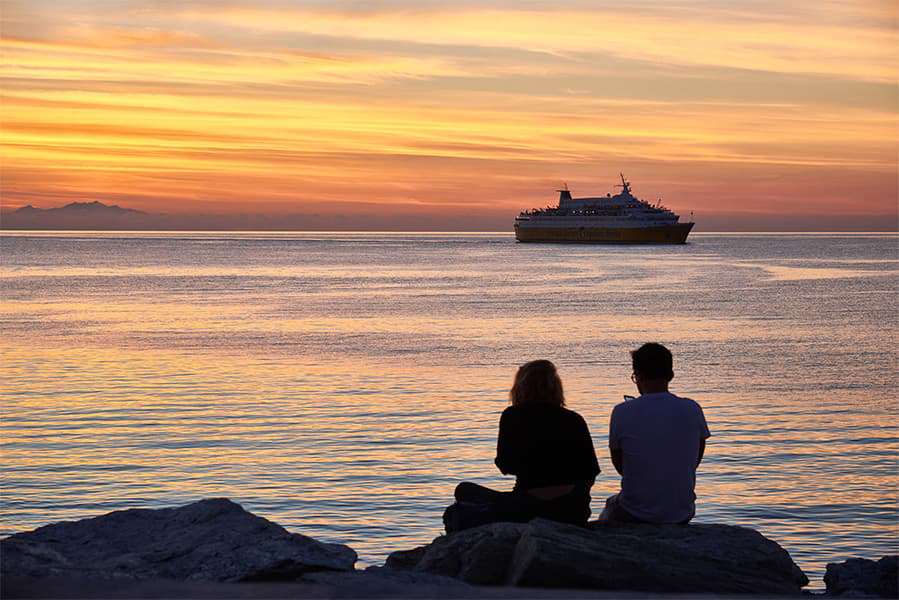Bol – Hvar
Ferries to Hvar Island
Bol – Hvar
Ferries to Hvar Island

There are around 6 weekly sailings from Bol to Hvar. 2 ferry operators sail between Bol to Hvar, these include
Ferries from Bol to Hvar typically depart from Bol at around 16:45. The average sailing time of a Hvar Bol ferry is approximately 50m.
Ferry prices for Bol Hvar ferries typically range between €50* and €100*. The average price is around €58*. The cheapest ferry prices from Bol to Hvar start from €25*. The average price for a foot passenger is €58*.
Pricing will vary by season and depend on the number of passengers, vehicle type and sailing time.
The distance between Bol to Hvar is approximately 16.0 miles (25.7km), or 13.9 nautical miles.
No ferry operators currently provide a car ferry between Bol and Hvar
Yes, foot passengers can travel on ferries from Bol to Hvar with Jadrolinija, TP Line.
More routes than anyone else.

Compare fares, times & routes in one place.
Change plans easily with flexi tickets.

Book e-tickets & manage trips in-app.
Live ship tracking & real-time updates.

Top-rated customer support when you need it.
| Bol - Hvar Route summary | ||
|---|---|---|
| Departure Country | Croatia | |
| Destination Country | Croatia | |
| No. of Operators | 2 | |
| Operators | Jadrolinija & TP Line | |
| Average Price | 58 €* | |
| Average Weekly Sailings | 6 | |
| Average Sailing Duration | 50m | |
| First Ferry | 16:45 | |
| Distance | 13 nautical miles | |
* Prices subject to change, pricing is taken from last 30 days, last updated 2024-09-04.
Bol Port borders the Adriatic Sea on the south east coast of Croatia, lying close to the Bosnia and Herzegovina border. Its unique gravel and sandy beaches host drinking water sources, and stretching for up to 10km, it’s quickly become an upcoming gem in Croatia’s thriving tourism industry. Bol Port offers crossings with Croatia Ferries to several of Croatia’s most popular tourism areas, including the historic town of Dubrovnik and the lively city of Split. There is also a crossing to the island of Hvar, a famed spot for holidaymakers looking to relax in the sun. The crossing to Dubrovnik usually lasts around five hours, whereas the crossings to Hvar and Split tend to take just over an hour. The crystal clear waters and fascinating cave structures attract millions of visitors each year, transforming Croatia’s south east coast into a hub of tourism.
Found on the frayed western coast of Hvar island, one of the larger isles that streak along the Dalmatian coast region of Croatia, is the port city of Hvar. The entire community stretches along the edge of a stunning natural bay, its impossible blue Mediterranean waters almost fluorescent beneath the sultry glow of the summer sun. The city outskirts are shaped by steep, limestone hills that rise towards a thriving swathe of olive groves and lavender farms. These slopes are carpeted in verdant pine trees and grassland tinged by the multi-hued blooms of exotic flowers. Hvar’s twist of medieval streets and plazas all lead towards the stunning promenade that curves around the bay. Here the city thrums with life. Handmade arts and crafts are sold beneath canvas-topped market stalls; quaint restaurants and bars, their verandas overlooking the busy marina, hum with cheery conversation; and locals stroll along the flagstones to the sound of the surf gently lapping against the bay’s edge. The port of Hvar is found at one end of the bay, its location marked by a bright green lamppost. There are no facilities here with the ferry terminal consisting of nothing more than a check-in kiosk on a designated corner of the promenade. Travelling to and from the port can prove difficult as it cannot be reached directly by car. Those driving into the city with the intention of using the ferry must find a place to park in the city, though a few parking facilities can be found near the promenade. There is only one main road on the island too. The D116 highway skirts the edge of the city before cutting a weaving path through the hills to the other settlements in the east. Only one route currently operates from the port in Hvar. An SNAV line sails to Pescara on the eastern coast of mainland Italy a few times throughout the week. It’s a route that takes passengers out of the bay and then a relatively short distance across the crystalline waters of the Adriatic Sea.